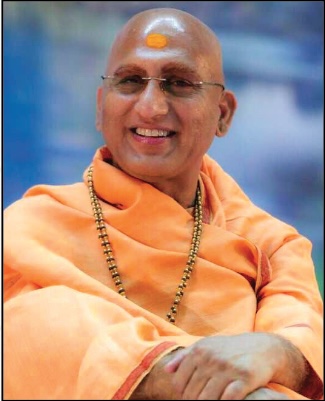Understanding the self and understanding our social and spiritual obligations are the keys to success both in the temporal and eternal worlds
By Swami Avdheshanand Giri Maharaj
A cactus plant wilts in the river, but a lotus grows profusely in the same river because the former is rooted in the sand and the latter is connected with water. It shows that for proper development and perfect living, every living creature needs to be firmly attached to its core or roots. The same logic applies with human existence and development, where spirituality is the root of the human soul, and in the absence of spirituality a person dies virtually, though physically he remains alive. Such a body without the soul is nothing but a mass of confusions and problems that can open a Pandora’s box for all humanity. An unspiritual person neither lives in peace nor does he let others live peacefully. Hatred, terrorism, cruelty, injustice, oppression, corruption and other forms of evil are born from nowhere but an unguided, imperfect and unspiritual mind.
The transition of life from a dark womb to the fullness of the glittering world is subject to variations from one phase to another. During this evolution, the heart continuously tries to adapt to the changing environment; but, irrespective of physical and social variations, the soul wants to push itself towards its roots—spirituality. When the heart and soul move in the same direction, the individual gets success in finding and embracing God; but when they oppose each other, it is one’s knowledge that decides one’s fate. Again, if knowledge is true and virtuous, then it will strengthen the soul and help it to embrace spirituality, but if the knowledge is impure and vicious, then it will incite the heart to defy and suppress the soul with whims, fancies and unjustified desires.
Material gain is not absolute and enduring; spiritual gain is perfect and eternal. It is lack of vision and knowledge which deprives the majority of realizing the actual worth and importance of spirituality. The fast-paced environment and cutthroat competition in every walk of life have diverted the present generation from the virtuous goals of life—i.e., perfection.
To attain perfection, one has to follow the six indispensable steps: selfless service, self-assessment, companionship of righteous people, patience through self-discipline, tenacity in beholding spirituality and self-development. When one understands these six steps in a true sense and abides by them firmly, his consciousness awakes, his conscience gets cleared and his thoughts enlightened. Such people do every bit to please God and refrain from every action that tarnishes their spirituality and displeases God. They live in harmony with every living and nonliving creature, and they accept nature as much as nature accepts them. For such a person, conflict with any element of nature is impossible, including fellow beings.
Ishwar is the Supreme Creator, and humans are His most beautiful offerings to the universe, with their distinct physical, intellectual and spiritual abilities. He has revealed in the Vedas, our holy scriptures, that the final goal of life is moksha (salvation); and to attain moksha, one has to perform dharma (righteousness), artha (honest earning and its honest use) and kama (fulfillment of noble desires). Dharma, artha and kama are difficult or almost impossible to implement in life without realizing one is a divine being. If one has failed to realize this, he can never ever understand what is his/her dharma, what is the legitimate way to earn and consume resources (artha) and what are the noble ways to fulfill his/her desires (kama).
Modern life is fully equipped with a hectic style, and people find it challenging to incorporate these spiritual practices, virtues and principles into their lives. To implement the spiritual principles and practices in modern life, one ought to invest his time and energy in deep meditative contemplation and reflection, which will surely bring the commendable positive transformation of behavior, thinking and life. To further grow, he can endeavor to achieve spiritual perfection and self-discovery that would ultimately lead him to the path of moksha or salvation in true terms.
Sadhana Chatushtaya is the fourfold means for the achievement of spiritual liberation and moksha prescribed in the Vedantic philosophy. To embark on the journey of truth, one must commit to this set of spiritual practices, comprised of viveka (discriminative knowledge), vairagya (non-attachment), shamaadi shatka sampati (six-fold virtues: tranquility, restraint of the senses, forbearance, protection against covetousness, boundless faith and equipoise), and mumukshutva (desire for liberation). Without following these four practices, no spiritual progress can be made. Therefore, the spiritual aspirant should not only know these practices but master each of them to find the purpose of his life and attain his goals.
Understanding the self and understanding our social and spiritual obligations is the key to success both in the temporal and eternal worlds. Once we come to know our divine self, nothing else remains to be misunderstood. When a person discovers himself/herself in the true sense, he/she reaches the uppermost level of wisdom and starts living the life which guides him/her to moksha. The discovery of our divine self is the solution to all the contemporary problems of the present world. Be they social conflicts, degrading family values, corruption, pollution or even terrorism, the root of all problems is the failure to explore our divine self, which can be achieved only through being spiritual and helping others on the path of spirituality.
Swami Avdheshanand Giri Maharaj, Acharya Mahamandaleshwar of the Juna Akhara, received the 2008 Hindu Renaissance Award from Hinduism Today (bit.ly/avdheshanand). A guru to thousands and an inspiration to millions, Swami Avdheshanand has initiated more than a hundred thousand sannyasins, transformed lives with his social initiatives and led Hinduism’s largest monastic order into the 21st century.


